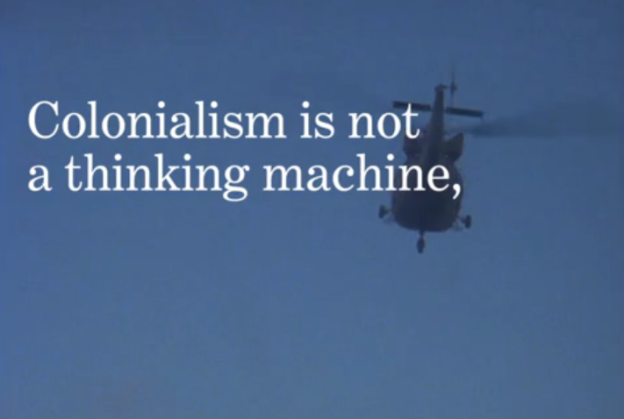“And it is clear that in the colonial countries the peasants alone are revolutionary, for they have nothing to lose and everything to gain. The starving peasant, outside the class system is the first among the exploited to discover that only violence pays. For him there is no compromise, no possible coming to terms; colonization and decolonization is simply a question of relative strength.”
―Frantz Fanon, “The Wretched of the Earth”
In the abyss of a dark theatre, and in the wake of quiet murmurs of anticipation, the face of Gayatri Chakravorty Spivak emerges.
A literary theorist and subversive philosopher who is considered to have written one of the founding texts of postcolonialism, Spivak opens the film Concerning Violence: Nine Scenes from the Anti-Imperialistic Self-Defense with a reflection of the legacy of Frantz Fanon. Directed by Swedish filmmaker Göran Olsson, this 2014 documentary is an illustration of Fanon’s profound text, The Wretched of the Earth. Readers of Spivak’s works are likely to be familiar with Fanon, an Afro-French psychiatrist, philosopher and revolutionary who has been of one of the most influential thinkers in the areas of post-colonial studies, critical theory and Marxism. Narrated by the bold, soothing voice of Lauryn Hill, an American singer and actor, the film relays nine scenes from Africa’s anti-imperial liberation movements of the mid-twentieth century, with the accompaniment of Fanon’s words from The Wretched of the Earth. For those not yet giddy about the prospect of witnessing such a production, let me assure you there are very few visual essays out there as captivating and poetic as Concerning Violence.
Watch the trailer here:
The cinematography of the film is uniquely compelling. Digging into the archives of Swedish Television, Olsson resurfaces nine clips of unfiltered footage documenting the struggles for decolonization in Africa, from Angola to Mozambique. Organized on the basis of these nine different parts, the film takes an overwhelming subject matter and guides us through them with the use of this astonishing footage. In one scene we watch the MPLA marching through forests, making their way to attack Portuguese military bases. In another, we see the interview of a European man in Rhodesia (present-day Zimbabwe) and witness the blatant racial logic that governed these systems of colonialism. We are given insight into the plight of exploited and striking mine workers in Liberia. We hear from the women of FRELIMO and their powerful accounts of why they decided to take up arms. Fanon’s words reverberate in the background of these various scenes, through Hill’s voice, giving them both context and meaning. The text is provided on screen to help the viewer follow along with Fanon’s unapologetic theorizing about the nature and practices of the colonizers and the colonized.
However, at times, Olsson’s experimental style becomes a bit disorienting. As the scenes fleet from one to the next, there are moments when one is left longing for just a bit more information about each scene, to be able to take in the next. As the scenes are of varying lengths, we are slightly thrown off balance because of this as well. Nevertheless, the riveting and often bracing imagery overrides these concerns. I was simply too captivated by each part to dwell on any shortcomings of a single one.
The film concludes with a call to action, employing some of the most powerful words from Fanon’s text. Fanon urges us to imagine a new world order; to mobilize and work towards radically restructuring our current global economic, social and political orders. Hill narrates:
“Come, then, comrades; it would be as well to decide at once to change our ways. We must shake off the heavy darkness in which we were plunged, and leave it behind. The new day which is already at hand must find us firm, prudent and resolute. […] Two centuries ago, a former European colony decided to catch up with Europe. It succeeded so well that the United States of America became a monster, in which the taints, the sickness and the inhumanity of Europe have grown to appalling dimensions. […] If we want to turn Africa into a new Europe, and America into a new Europe, then let us leave the destiny of our countries to Europeans. They will know how to do it better than the most gifted among us. […] But if we want humanity to advance a step farther, if we want to bring it up to a different level than that which Europe has shown it, then we must invent and we must make discoveries.”
These words sent chills through me and their impression marked me even well after I had left the theater. I reckon it will do the same for you.
Watch an excerpt from the film here:
This film was a part of Vancouver International Film Festival’s 2014 lineup and was sponsored by Ricochet.




